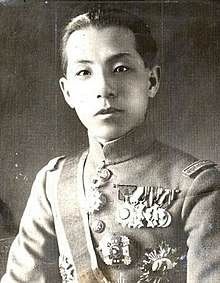
Back Zhang Xueliang Catalan Čang Süe-liang Czech Zhang Xueliang Danish Zhang Xueliang German Ĉang Hsueliang Esperanto Zhang Xueliang Spanish Zhang Xueliang Estonian Zhang Xueliang Finnish Zhang Xueliang French ג'אנג שו'ליאנג HE
Zhang Xueliang | |
|---|---|
張學良 | |
 Zhang in 1928 | |
| Warlord of Manchuria | |
| In office June 4 – December 29, 1928 | |
| Preceded by | Zhang Zuolin |
| Succeeded by | Office abolished |
| Personal details | |
| Born | June 3, 1901 Tai'an County, Fengtian, Qing Empire |
| Died | October 15, 2001 (aged 100) Honolulu County, Hawaii, U.S. |
| Resting place | Valley of the Temples Memorial Park, Honolulu County, Hawaii |
| Nationality | Chinese |
| Spouses | |
| Children | 5 |
| Parent |
|
| Relatives | Zhang Xueming (brother) |
| Awards | Order of Rank and Merit Order of Wen-Hu Order of Blue Sky and White Sun |
| Nickname(s) | Young Marshal (Chinese: 少帥; pinyin: shàoshuài) |
| Military service | |
| Allegiance |
|
| Branch/service | |
| Rank | General of the Army[citation needed] |
| Commands | Northeast Peace Preservation Forces |
| Battles/wars | |
| Zhang Xueliang | |||||||||||
|---|---|---|---|---|---|---|---|---|---|---|---|
| Traditional Chinese | 張學良 | ||||||||||
| Simplified Chinese | 张学良 | ||||||||||
| |||||||||||
Zhang Xueliang[note 3] (Chinese: 張學良; June 3, 1901[note 4] – October 15, 2001) was a Chinese general who in 1928 succeeded his father Zhang Zuolin as the commander of the Northeastern Army. He is best known for his role in the Xi'an Incident in 1936, in which he arrested Chiang Kai-shek and forced him to form a Second United Front with the Chinese Communist Party against the Japanese.
In 1928, Zhang, at the time a general in the Northeastern Army, became the commander of the army and leader of the Fengtian clique upon his father's assassination. A reformer sympathetic to nationalist ideas, he completed the official reunification of China by pledging loyalty to the Nationalist government, and used his powerful base to wield significant influence in the politics of the Nanjing decade. Zhang followed Chiang's policy of nonresistance to the Japanese invasions of Manchuria in 1931 and Rehe in 1933, after which he was forced to resign as head of the Northeastern Army. In 1935, Zhang was again appointed its commander to suppress the Communists, but became disillusioned with Chiang's policy of "stabilizing China before resisting Japan", and helped to plan the Xi'an Incident. Following the incident, Chiang had Zhang arrested for insubordination and sentenced to house arrest, first in mainland China and then in Taiwan. Zhang would remain under confinement until 1988, a period of more than 50 years.
Cite error: There are <ref group=note> tags on this page, but the references will not show without a {{reflist|group=note}} template (see the help page).